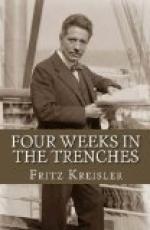In Leoben my wife and I remained a week, which was spent in organizing, equipping, requisitioning, recruiting, and preliminary drilling. These were happy days, as we officers met for the first time, friendships and bonds being sealed which subsequently were tested in common danger and amidst privation and stress. Many of the officers had brought their wives and soon delightful intercourse, utterly free from formality, developed, without any regard or reference to rank, wealth, or station in private life. Among the reserve officers of my battalion were a famous sculptor, a well-known philologist, two university professors (one of mathematics, the other of natural science), a prince, and a civil engineer at the head of one of the largest Austrian steel corporations. The surgeon of our battalion was the head of a great medical institution and a man of international fame. Among my men in the platoon were a painter, two college professors, a singer of repute, a banker, and a post official of high rank. But nobody cared and in fact I myself did not know until much later what distinguished men were in my platoon. A great cloak of brotherhood seemed to have enveloped everybody and everything, even differences in military rank not being so obvious at this time, for the officers made friends of their men, and in turn were worshipped by them.
My wife volunteered her services as Red Cross nurse, insisting upon being sent to the front, in order to be as near me as could be, but it developed later that no nurse was allowed to go farther than the large troop hospitals far in the rear of the actual operations. Upon my urgent appeal she desisted and remained in Vienna after I had left, nursing in the barracks, which are now used for hospital work. In fact, almost every third or fourth house, both private and public, as well as schools, were given to the use of the government and converted into Red Cross stations.
The happy days in Leoben came to an abrupt end, my regiment receiving orders to start immediately for the front.
We proceeded to Graz, where we joined the other three battalions and were entrained for an unknown destination. We traveled via Budapest to Galicia, and left the train at Strij, a very important railroad center south of Lemberg. It must be understood that the only reports reaching us from the fighting line at that time were to the effect that the Russians had been driven back from our border, and that the Austrian armies actually stood on the enemy’s soil. Strij being hundreds of miles away from the Russian frontier, we could not but surmise that we were going to be stationed there some time for the purpose of training and maneuvering. This belief was strengthened by the fact that our regiment belonged to the Landsturm, or second line of reserves, originally intended for home service. We were, however, alarmed that very same night and marched out of Strij for a distance of about twenty miles, in conjunction with the entire




